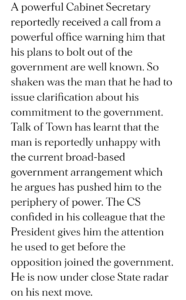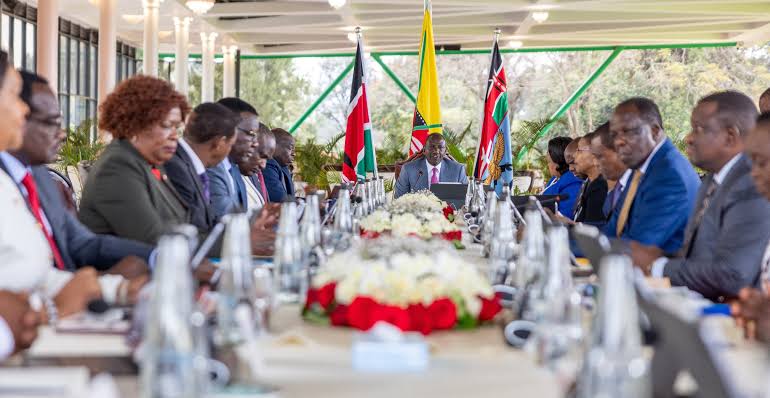Recent reports have exposed troubling conduct among senior government officials, raising major concerns about misuse of public resources, favoritism, and failure to uphold ethical standards.
These incidents involve a Cabinet Secretary who appeared ready to resign due to frustrations with the government structure, a state officer misusing funds through excessive travel, and another Cabinet Secretary accused of favoritism and tribalism. Each of these cases, while different, contributes to a growing public perception that some leaders are prioritizing personal or regional interests over national service.
According to Nation Africa, the tension within these government offices is not only real but growing by the day, with staff members quietly expressing dissatisfaction over what they describe as unfair treatment and outright abuse of office.

Screenshot from the Nation Africa.
In the first case, a prominent Cabinet Secretary allegedly considered stepping down due to being sidelined in the broad-based government arrangement, especially after the inclusion of opposition figures.
This move reportedly made him feel politically displaced and less powerful. His frustrations became the subject of political gossip, with reports indicating he was strongly considering exit. But before he could act, a powerful figure in government summoned him and warned him to stop entertaining such thoughts.
In response, he issued a public statement reaffirming his loyalty to the current administration, but the damage had already been done. His earlier sentiments sparked internal tension, with many now questioning his commitment and role within the current government.
The second case involves a state officer accused of misusing public funds through unnecessary travel. Staff under this officer allege that he has been travelling alone to events and conferences that do not benefit the ministry’s goals.

Photo: Cabinet Secretaries during the past meeting.
His solo trips deny the rest of the staff their allowances, and the office’s travel budget is reportedly already depleted. The situation has created tension among employees who feel overlooked, demoralized, and unable to perform their duties effectively due to financial constraints.
There are reports that the officer might begin requesting funds from other departments to support his travels, which raises fears about continued misuse of public resources and a lack of internal accountability. This behavior reflects a growing trend of self-enrichment at the expense of service delivery.
The third and perhaps most disturbing case involves a Cabinet Secretary who was appointed after public pressure from the Gen-Z movement, which demanded reforms and fresh faces in government. However, this new appointee is already facing backlash from his own ministry.
According to staff, he operates in a highly exclusionary manner, choosing only to meet people from his home region and ethnic background. Promotions are reportedly being handled in the same way, with individuals from his region advancing while others are ignored.
His supporters, also from his area, have taken over the office lobby, spending entire days there and demanding hospitality, which includes tea and access to the CS.
This has created an atmosphere of entitlement and deep frustration, especially among staff who feel alienated and disrespected.
These three cases have contributed to the perception that some government leaders are not genuinely committed to serving all Kenyans. Instead, they appear to be focused on personal advancement or regional loyalty.
The problem becomes more pronounced when considering that one of these individuals was appointed to appease youth protesters calling for change, only for him to replicate the same problematic behaviors that Gen-Z had rejected.
The disappointment among young people is big, with many now questioning whether the current leadership is truly willing to reform or simply reshuffling the same old problems.
The broader implications of these revelations point to a deep erosion of public trust. At a time when Gen-Z and other younger generations are demanding transparency and inclusion, these examples of mismanagement, favoritism, and abuse of office send the wrong message.
People want leaders who are ethical, inclusive, and focused on public good not those who exploit their positions for personal or tribal gain.
It is now urgent for the government to act. Investigations must be conducted into all these allegations, and action should be taken if wrongdoing is confirmed.
Upholding ethical leadership is not just about punishing offenders but about creating a culture where service delivery, fairness, and integrity are the norm.
With public confidence hanging by a thread, the government must demonstrate that no official is above the law and that public resources belong to the people, not to the privileged few in power.



